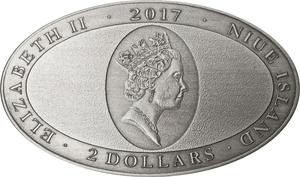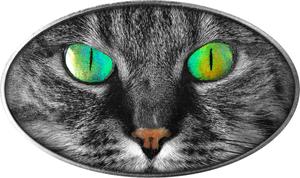Niue, a sovereign state in free association with New Zealand, uses two official legal tender currencies. The New Zealand Dollar is the circulation currency for daily transactions, while the government also authorises legal tender coins in the Niue Dollar currency for collector's purposes.
A number of mints issue a large variety of commemorative, bullion and collector coins under the authority of Niue. These coins are dedicated to historical or general popular culture themes not related to Niue itself. Many of them are in standard bullion sizes - typically, one ounce of silver (abbreviated as 1 oz Ag, where "Ag" comes from the Latin word for silver, Argentum). Many of these feature various animals.
This coin is part of the Animal Skins series; called Kitty Cat, it depicts a common house cat.
The mint says about it:
Who can resist the charm and affection of a purring cat? Cats can be incredibly relaxing and will be more than happy to offer a chin to tickle when you’re relaxing on the sofa. In fact, animal behaviour experts believe cats are able to sense our mood and many cat owners claim their cats often try to cheer them up if they are feeling down.
The domestic cat is a small, typically furry, carnivorous mammal. They are often called house cats when kept as indoor pets or sim-ply cats when there is no need to distinguish them from other felids and felines.
Since cats were venerated in ancient Egypt, they were commonly believed to have been domesticated there, but there may have been instances of domestication as early as the Neolithic from around 9,500 years ago (7,500 BC). A genetic study in 2007 concluded that domestic cats are descended from Near Eastern wildcats, having diverged around 8,000 BC in West Asia. A 2016 study found that leopard cats were undergoing domestication independently in China around 5,500 BC, though this line of partially domesticated cats leaves no trace in the domesticated populations of today. | 




 Search for Niue: Silver Ounce 2017 Animal Skins - Kitty Cat on eBay
Search for Niue: Silver Ounce 2017 Animal Skins - Kitty Cat on eBay 
